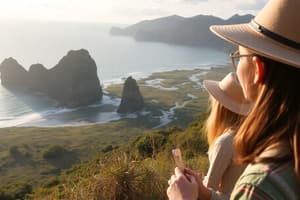Podcast
Questions and Answers
What is the primary goal of ecotourism?
What is the primary goal of ecotourism?
- To minimize ecological impact and promote conservation (correct)
- To promote mass tourism
- To maximize profit for travel companies
- To provide luxury travel experiences
Which principle of ecotourism focuses on reducing negative effects on communities and the environment?
Which principle of ecotourism focuses on reducing negative effects on communities and the environment?
- Encourage urban tourism
- Build environmental awareness
- Minimize impacts (correct)
- Provide positive experiences
What does ecotourism encourage travelers to do with local cultures?
What does ecotourism encourage travelers to do with local cultures?
- Alter local customs for tourists
- Ignore local traditions
- Engage and respect local customs (correct)
- Police local customs
Which of the following elements is NOT a focus of ecotourism?
Which of the following elements is NOT a focus of ecotourism?
What role does sustainability play in ecotourism?
What role does sustainability play in ecotourism?
How does ecotourism provide positive experiences?
How does ecotourism provide positive experiences?
What is one major aspect of education in ecotourism?
What is one major aspect of education in ecotourism?
Which benefit does ecotourism seek to create for travelers and local communities?
Which benefit does ecotourism seek to create for travelers and local communities?
What is a primary focus of ecotourism?
What is a primary focus of ecotourism?
How does community-based ecotourism benefit local communities?
How does community-based ecotourism benefit local communities?
What aspect does ecotourism promote regarding ethical travel?
What aspect does ecotourism promote regarding ethical travel?
Which of the following is true about the scale of tourism promoted by ecotourism?
Which of the following is true about the scale of tourism promoted by ecotourism?
What is a key activity associated with ecotourism?
What is a key activity associated with ecotourism?
Which of the following best describes the term 'tourism' at its core?
Which of the following best describes the term 'tourism' at its core?
What is the goal of respecting wildlife in ecotourism?
What is the goal of respecting wildlife in ecotourism?
What role do interpretive programs play in ecotourism?
What role do interpretive programs play in ecotourism?
What is the primary benefit of hiking and trekking in ecotourism?
What is the primary benefit of hiking and trekking in ecotourism?
In wildlife viewing and safaris, what is emphasized to ensure a respectful experience?
In wildlife viewing and safaris, what is emphasized to ensure a respectful experience?
What is a key feature of birdwatching in ecotourism?
What is a key feature of birdwatching in ecotourism?
What advantage do kayaking and canoeing provide in ecotourism?
What advantage do kayaking and canoeing provide in ecotourism?
What is the primary focus of snorkeling and scuba diving in marine environments?
What is the primary focus of snorkeling and scuba diving in marine environments?
Which practice is encouraged for nature photography in ecotourism?
Which practice is encouraged for nature photography in ecotourism?
What is the primary goal of educational programs in ecotourism?
What is the primary goal of educational programs in ecotourism?
What type of environments do ecotourism activities like snorkeling focus on?
What type of environments do ecotourism activities like snorkeling focus on?
What is the primary focus of ecotourism?
What is the primary focus of ecotourism?
Which organization was established in 1990 to promote responsible tourism practices?
Which organization was established in 1990 to promote responsible tourism practices?
According to the Ten Commandments of Ecotourism, what should tourists avoid removing from natural habitats?
According to the Ten Commandments of Ecotourism, what should tourists avoid removing from natural habitats?
What is one of the goals of ecotourism as it has evolved?
What is one of the goals of ecotourism as it has evolved?
What does the second commandment of ecotourism emphasize?
What does the second commandment of ecotourism emphasize?
How has ecotourism adapted to align with sustainable practices?
How has ecotourism adapted to align with sustainable practices?
What action is recommended under the fifth commandment of ecotourism?
What action is recommended under the fifth commandment of ecotourism?
Which principle is emphasized in the Ten Commandments of Ecotourism regarding local cultures?
Which principle is emphasized in the Ten Commandments of Ecotourism regarding local cultures?
What is essential for ensuring the sustainability of ecotourism?
What is essential for ensuring the sustainability of ecotourism?
Which of the following best describes a sustainable component in ecotourism?
Which of the following best describes a sustainable component in ecotourism?
What role does education play in ecotourism?
What role does education play in ecotourism?
What aspect of ecotourism can vary according to visitor behavior?
What aspect of ecotourism can vary according to visitor behavior?
What was a significant milestone for the official recognition of ecotourism?
What was a significant milestone for the official recognition of ecotourism?
Which factor is NOT indicated as a critical element for managing ecotourism's impacts?
Which factor is NOT indicated as a critical element for managing ecotourism's impacts?
What is a potential negative social impact of ecotourism?
What is a potential negative social impact of ecotourism?
Which of the following is NOT a benefit associated with ecotourism?
Which of the following is NOT a benefit associated with ecotourism?
Flashcards
What is Ecotourism?
What is Ecotourism?
Responsible travel to natural areas that prioritizes minimizing ecological impact and supporting local communities.
Nature & Conservation
Nature & Conservation
Focuses on natural areas like national parks and wildlife reserves to promote biodiversity and ecosystems.
Sustainability
Sustainability
Incorporates practices that conserve resources and support local conservation efforts.
Education & Interpretation
Education & Interpretation
Signup and view all the flashcards
Community Involvement
Community Involvement
Signup and view all the flashcards
Ethical Travel
Ethical Travel
Signup and view all the flashcards
Small-scale Tourism
Small-scale Tourism
Signup and view all the flashcards
Conceptual Definition of Ecotourism
Conceptual Definition of Ecotourism
Signup and view all the flashcards
Components of Ecotourism
Components of Ecotourism
Signup and view all the flashcards
Hiking and Trekking
Hiking and Trekking
Signup and view all the flashcards
Wildlife Viewing and Safaris
Wildlife Viewing and Safaris
Signup and view all the flashcards
Birdwatching
Birdwatching
Signup and view all the flashcards
Kayaking and Canoeing
Kayaking and Canoeing
Signup and view all the flashcards
Snorkeling and Scuba Diving
Snorkeling and Scuba Diving
Signup and view all the flashcards
Nature Photography
Nature Photography
Signup and view all the flashcards
Educational Programs
Educational Programs
Signup and view all the flashcards
Sustainable Component
Sustainable Component
Signup and view all the flashcards
Educational Components
Educational Components
Signup and view all the flashcards
Economic Impacts
Economic Impacts
Signup and view all the flashcards
Environmental Impacts
Environmental Impacts
Signup and view all the flashcards
Social Impacts
Social Impacts
Signup and view all the flashcards
Evolution of Ecotourism
Evolution of Ecotourism
Signup and view all the flashcards
International Ecotourism Society (TIES)
International Ecotourism Society (TIES)
Signup and view all the flashcards
What does the TIES provide?
What does the TIES provide?
Signup and view all the flashcards
1st Commandment of Ecotourism
1st Commandment of Ecotourism
Signup and view all the flashcards
2nd Commandment of Ecotourism
2nd Commandment of Ecotourism
Signup and view all the flashcards
3rd Commandment of Ecotourism
3rd Commandment of Ecotourism
Signup and view all the flashcards
4th Commandment of Ecotourism
4th Commandment of Ecotourism
Signup and view all the flashcards
Study Notes
What is Ecotourism?
- A form of tourism emphasizing responsible travel to natural areas.
- Aims to minimize ecological impact and promote conservation.
- Encourages activities that benefit local communities and raise awareness of environmental preservation.
Principles of Ecotourism
- Minimize negative impacts on environment and local cultures, including pollution and wildlife disturbance.
- Foster environmental and cultural awareness and respect among travelers.
- Create positive experiences for both visitors and hosts, supporting local businesses.
Elements of Ecotourism
- Nature and Conservation: Focus on visiting natural areas like national parks and wildlife reserves to promote biodiversity and ecosystems.
- Sustainability: Incorporates practices that conserve resources and support local conservation efforts.
- Education and Interpretation: Aims to educate travelers on conservation importance through tours and educational programs.
- Community Involvement: Engages local communities in decision-making and benefits-sharing to stimulate local economies.
- Ethical Travel: Respects rights of local peoples, promoting responsible behavior and local commerce.
- Small-scale Tourism: Prioritizes low-impact operations for a more immersive experience.
Conceptual Definition of Ecotourism
- Defined as the movement of people for leisure or business purposes away from their usual environment.
- Tourism includes activities of traveling and staying outside habitual environments for no more than one year.
Components of Ecotourism
- Emphasizes the protection and appreciation of natural environments while reducing biodiversity impacts.
Activities of Ecotourism
- Hiking and Trekking: Explore landscapes while promoting physical activity and environmental appreciation.
- Wildlife Viewing and Safaris: Prioritize observing animals in their natural habitats with respectful practices.
- Birdwatching: Focused on observing bird species, often led by knowledgeable guides.
- Kayaking and Canoeing: Allows exploration of aquatic ecosystems with minimal environmental disturbance.
- Snorkeling and Scuba Diving: Enable exploration of coral reefs and marine conservation education.
- Nature Photography: Encourages capturing natural beauty with responsible photography practices.
- Educational Programs: Raise awareness about conservation through workshops and interactive educational experiences.
Sustainable Component
- Refers to practices that ensure responsible natural resource use, biodiversity conservation, and support for local communities.
Local Issues
- While promoting sustainable tourism, certain issues must be addressed to ensure benefits for local communities.
Educational Components
- Education is crucial in ecotourism for raising awareness about sustainable practices.
Ecotourism Management Considerations
- Economic Impacts: Can enhance local economies through job creation and new businesses.
- Environmental Impacts: Vary based on management and visitor behavior; proper regulation is essential.
- Social Impacts: Can be both positive and negative, requiring careful management for community benefits.
Evolution of Ecotourism
- Originated in the early 1980s to explore while minimizing environmental harm.
- Gained recognition in 1982 when officially defined.
- Evolved to cover wildlife conservation, cultural preservation, and community development.
International Ecotourism Society (TIES)
- Founded in 1990 to promote responsible tourism that benefits conservation and communities.
- Provides guidelines, training, and resources for ecotourism development and management.
Ten Commandments of Ecotourism
- Respect the environment and local cultures.
- Leave no trace and minimize waste.
- Support local economies through purchases.
- Practice responsible behavior in local ecosystems.
Studying That Suits You
Use AI to generate personalized quizzes and flashcards to suit your learning preferences.




